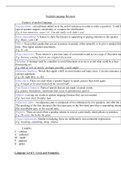English Language Revision
- Features of spoken language
Tag questions: extra phrases added on to the end of sentences in order to make a question. Could b
sign of speaker support, uncertainty or a request for clarification.
E.g. It was tomorrow, wasn’t it? You did really well, didn’t you?
Back-channelling: A feature to show the listener is supporting or paying attention to the speaker.
E.g. Mmm, yeah, OK
Fillers: Non-verbal sounds that can act as pauses in speech, either naturally or to give a speaker thin
time. May signal speaker uncertainty.
E.g. Er, um
Skip connectors: These return to a previous topic of conversation and act as a type of discourse ma
E.g. Anyway, coming back to our original discussion
Hedging: A strategy used by a speaker to avoid directness or to try to avoid what could be a face-
threatening act.
E.g. kind of, sort of, maybe, perhaps, possibly, could, might
Discourse markers: Words that signal a shift in conversation and topic areas. Can also announce a
counter-argument.
E.g. Ok, right then, so, but
False starts: These are used when a speaker begins to speak, pauses then starts again.
E.g. It began er Arsenal kicked off the second half
Non-fluency features: Parts of speech that are not made of actual words.
E.g. pauses, hesitations, repetitions that occur in spontaneous speech.
Ellipsis: Leaving out words in spoken language because they are not needed.
E.g. Just seen Jack, Tonight, 8pm
Adjacency pairs: An adjacency pair is composed of two utterances by two speakers, one after the o
The speaking of the first utterance (the first-pair part, or the first turn) provokes a responding utteran
(the second-pair part, or the second turn).
Repairs: These are used when a speaker returns to correct a previously stated phrase or sentence.
E.g. He sorry she broke the glass.
Vague expressions: Similar to hedging, these are deliberately non-committal expressions.
E.g. Anything, something, thing, whatsit
- CAMPG
C – context
A – audience
M – mode
P – purpose
G – genre
Language Level 1: Lexis and Semantics
,Word class – a group of words that fulfil the same kind of role.
Nouns – a word that names a thing or concept
- Proper – refers to names of people or places (James, England)
- Abstract – refers to states, feelings and concepts that do not have the physical
existence (love, anger)
- Concrete – refers to objects that have a physical existence (countable / non-
countable)
Verbs – a word that shows a state of being, action or concept
- Material – show actions or event (hit, jump)
- Relational – identify properties or show states of being (appear, become)
- Mental – show internal processes such as thinking (think, believe)
- Verbal – show external processes of communicating through speech (say,
shout)
Adjectives / adverbs – a word that modifies a noun / a word that modifies a verb
- Base – the basic form of an adjective or adverb (big)
- Comparative – a form used to compare two instances (bigger)
- Superlative – identifying the best example (biggest)
Pronouns – a word that substitutes for a noun
- Personal – refers to people in terms of first or second person etc. (I, you, he)
- Demonstrative – orientate a reader towards a person (this, those)
- Indefinite – refers to a person, object or idea that is not specific (someone,
anybody)
Determiners – a word that adds detail or clarity to a noun
- Articles – show that something is definite or indefinite (the, a/an)
- Possessives – shows ownerships (my, your)
- Quantifiers – show either specific / non-specific quantities of a noun (one, two
= specific / few, some = non-specific)
Conjunctions
- Co-ordinating – link words or larger structures such as phrases and clauses
together (and, but)
- Sub-ordinating – link clauses together to show one is dependent on another
(because, although)
Verbs broken down:
, Main – action or doing verbs
Auxiliary – usually placed in front of a main verb to support it
- Primary – determines if something would happen
- Modal – likelihood of happening
o Modal of possibility – ‘I could’
o Modal of obligation – ‘I must’
o Modal of certainty – ‘I will’
Semantic field – a group of words that fulfil the same kind of role
Euphemism = A mild or indirect term which replaces one considered too harsh, blunt
or embarrassing. E.g. Kicked the bucket= dead; downsizing= budget/ staff cuts.
Dysphemism = A derogatory or unpleasant term used instead of a pleasant or neutral
one. E.g. pig= policeman, bullshit= lies
Idiom = A group of words established as having a meaning not easy to work out from
the words. E.g. over the moon.
Language level 2: Grammar




